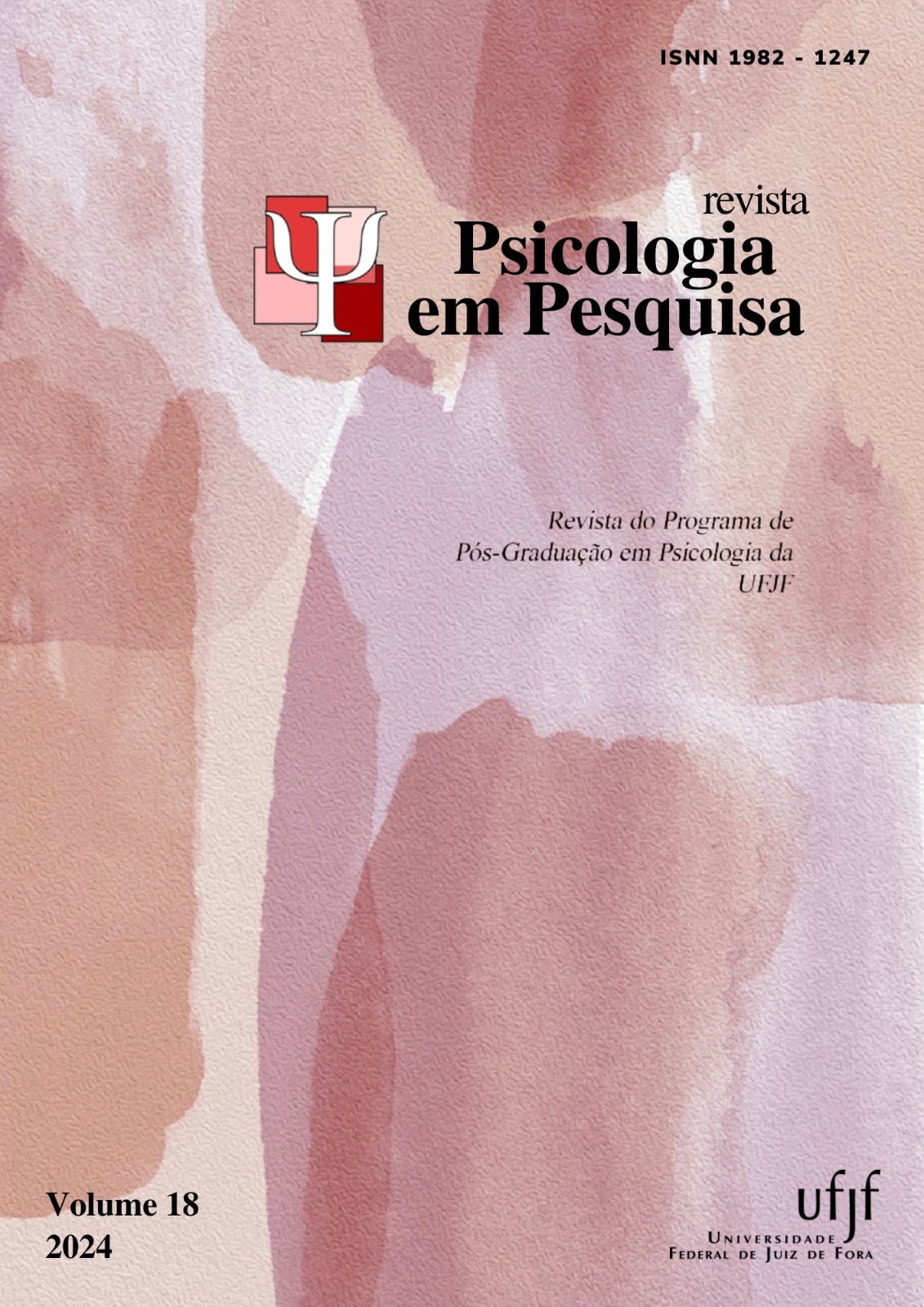Perfil de dificuldades de leitura em estudantes do ensino superior
DOI:
https://doi.org/10.34019/1982-1247.2024.v1.37716Palavras-chave:
Dislexia, Ensino Superior, Dificuldades de Leitura, Grupo Focal, Avaliaçaõ, Dyslexia, Higher Education, Reading disabilities, Focus group, Assessment, Enseñanza superior, Dificultades de lectura, Grupo focal, EvaluaciónResumo
A dislexia é um transtorno específico de aprendizagem que afeta a leitura e prejudica o
desempenho acadêmico e profissional. O ensino superior é um contexto educacional que
demanda mais dos disléxicos do que suas estratégias conseguem compensar. O presente
estudo apresenta um projeto de pesquisa e extensão que objetiva identificar discentes com
dificuldade de leitura, através da avaliação de decodificação e compreensão textual.
Também foram analisadas informações provenientes de grupos focais acerca da percepção
de dificuldades e das estratégias de enfrentamento utilizadas. Por fim, é discutida a
importância da identificação do transtorno em universitários e a falta de políticas públicas.
Downloads
Referências
Ali, K., Kisielewska, J., Subhan, M. M. F., & Tredwin, C. (2020). How does dyslexia impact on the educational experiences of healthcare students? A qualitative study. European Journal of Dental Education, 24(1), 154–162. https://doi.org/10.1111/eje.12479
American Psychiatric Association. (2014). DSM-5: Manual diagnóstico e estatístico de transtornos mentais. Artmed.
Carvalhais, L. S. A., & Silva, C. (2007). Consequências sociais e emocionais da dislexia de desenvolvimento: Um estudo de caso. Psicologia Escolar e Educacional, 11(1), 21-29. https://doi.org/10.1590/S1413-85572007000100003
Coltheart, M., Rastle, K., Perry, C., Langdon, R., & Ziegler, J. (2001). DRC: A dual route cascaded model of visual word recognition and reading aloud. Psychological Review, 108(1), 204–256. https://doi.org/10.1037/0033-295X.108.1.204
Dobson, S. (2018). A documentary analysis of the support services offered to adult learners with dyslexia in higher education. Journal of Further and Higher Education, 43(9), 1181-1195. https://doi.org/10.1080/0309877X.2018.1463359
Evans, W. (2014). ‘I am not a dyslexic person, I'm a person with dyslexia’: Identity constructions of dyslexia among students in nurse education. Journal of Advanced Nursing, 70(2), 360-372. https://doi.org/10.1111/jan.12199
Friedmann, N., & Coltheart, M. (2018). Types of developmental dyslexia. In A. Bar-On, & D. Ravid (Eds.), Handbook of communication disorders: Theoretical, empirical, and applied linguistic perspectives (pp. 721-751). De Gruyter Mouton.
Gough, P. B., & Tunmer, W. E. (1986). Decoding, reading, and reading disability. Remedial And Special Education, 7(1), 6–10. https://journals.sagepub.com/doi/10.1177/074193258600700104
Hoover, W. A., & Gough, P. B. (1990). The simple view of reading. Reading and Writing: An Interdisciplinary Journal, 2(2), 127–160. https://doi.org/10.1007/BF00401799
Hoyles, A., & Hoyles, M. (2010). Race and dyslexia. Race Ethnicity and Education, 13(2), 209–231. https://doi.org/10.1080/13613321003726835
Jordan, J. A., McGladdery, G., & Dyer, K. (2014). Dyslexia in Higher Education: Implications for maths anxiety, statistics anxiety and psychological well-being. Dyslexia, 20(3), 225–240. https://doi.org/10.1002/dys.1478
Lamego, D. T. C., & Moreira, M. C. N. (2019). O diagnóstico como “passaporte” para reconhecimento e significação das experiências na dislexia. Physis, 29(3), 1-22. https://doi.org/10.1590/S0103-73312019290311
Lei nº 13.146, de 6 de julho de 2015. (2015). Institui a Lei Brasileira de Inclusão da Pessoa com Deficiência (Estatuto da Pessoa com Deficiência). Diário Oficial da União, Brasília. Recuperado de http://www.planalto.gov.br/ccivil_03/_ato2015-2018/2015/lei/l13146.htm
Lei nº 14.254, de 30 de novembro de 2021. (2021). Dispõe sobre o acompanhamento integral para educandos com dislexia ou Transtorno do Déficit de Atenção com Hiperatividade (TDAH) ou outro transtorno de aprendizagem. Diário Oficial da União, Brasília. Recuperado de http://www.planalto.gov.br/ccivil_03/_Ato2019-2022/2021/Lei/L14254.htm
MacCullagh, L., Bosanquet, A., & Badcock, N. A. (2017). University students with dyslexia: A qualitative exploratory study of learning practices, challenges and strategies. Dyslexia, 23(1), 3–23. https://doi.org/10.1002/dys.1544
Macdonald, S. J., & Deacon, L. (2018). Twice upon a time: Examining the effect socio-economic status has on the experience of dyslexia in the United Kingdom. Dyslexia, 25(1), 3-19. https://doi.org/10.1002/dys.1606
Oakhill, J., Cain, K., & Elbro, C. (2017). Compreensão de leitura: Teoria e prática (1a. ed.). Hogrefe CETEPP.
Olofsson, Å., Taube, K., & Ahl, A. (2015). Academic achievement of university students with dyslexia. Dyslexia, 21(4), 338–349. https://doi.org/10.1002/dys.1517
Peixoto, C. B., Murta, C. A., Machado, J. G. S., & Lopes-Silva, J. B. (2019). Subtipos de dislexia do desenvolvimento: Muito além de fonológica e de superfície. Mosaico: Estudos em Psicologia, 7(1), 75-102, https://periodicos.ufmg.br/index.php/mosaico/article/view/24823
Pitt, S., & Soni, A. (2018). Students’ experiences of academic success with dyslexia: A call for alternative intervention. Support for Learning, 32(4), 387-405. https://doi.org/10.1111/1467-9604.12182
Rodrigues, J. C., Miná, C. S., & Salles, J. F. (2018). TLPP - Tarefa de leitura de palavras e pseudopalavras. (1a. ed.). Vetor.
Rodrigues, J. C., Nobre, A. P., Gauer, G., & Salles, J. F. (2015). Construção da tarefa de leitura de palavras e pseudopalavras (TLPP) e desempenho de leitores proficientes. Temas em Psicologia, 23(2), 413-429. https://dx.doi.org/10.9788/TP2015.2-13
Shaw, S. C. K., & Anderson, J. L. (2018). The experiences of medical students with dyslexia: An interpretive phenomenological study. Dyslexia, 24(3), 220–233. https://doi.org/10.1002/dys.1587
Shaywitz, B. A., & Shaywitz, S. E. (2020). The American experience: Towards a 21st century definition of dyslexia. Oxford Review of Education, 46(4), 454-471. https://doi.org/10.1080/03054985.2020.1793545
Stoeber, J., & Rountree, M. L. (2020). Perfectionism, self-stigma, and coping in students with dyslexia: The central role of perfectionistic self-presentation. Dyslexia, 27(1), 62–78. https://doi.org/10.1002/dys.1666
Stampoltzis, A., Tsitsou, E., Plesti, H., & Kalouri, R. (2015). The learning experience of students with dyslexia in a greek higher education institution. International Journal of Special Education, 30(2), 157-170. https://eric.ed.gov/?id=EJ1094875
Zawadka, J., Miękisz, A., Nowakowska, I., Plewko, J., Kochańska, M., & Haman, E. (2021). Remote learning among students with and without reading difficulties during the initial stages of the COVID-19 pandemic. Education and Information Technologies, 26(1), 6973-6994. https://doi.org/10.1007/s10639-021-10559-3















